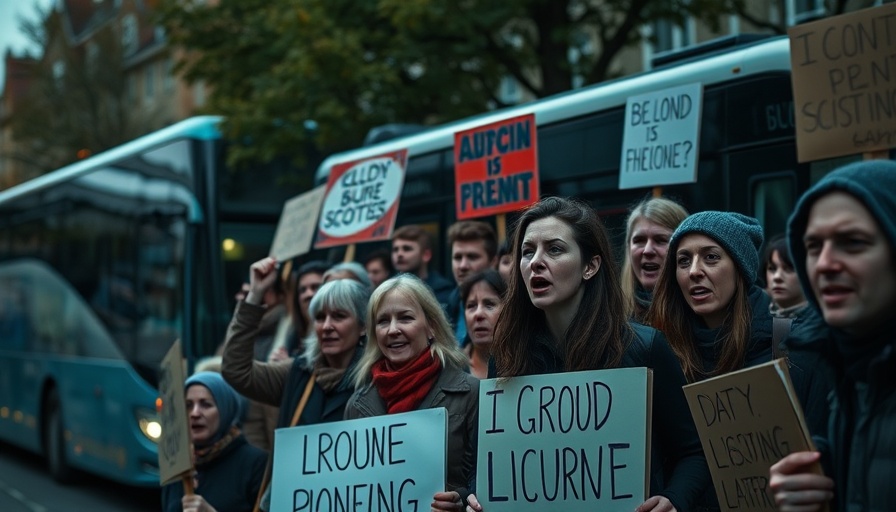
Protests and Golf: A Clash of Interests in Scotland
As former President Donald Trump indulges in a weekend of golfing at his Turnberry resort in Scotland—his mother's birthplace—he faces a cacophony of dissent from locals. Hundreds of protesters gathered over the weekend, demonstrating their displeasure at his visit and policies. Among the signs held aloft, the phrase "Scotland is already great" stood out, cleverly mocking Trump's well-known slogan, "Make America Great Again." This juxtaposition encapsulates the sentiments of many Scots who feel alienated from the former president's political narrative.
The Heart of the Opposition: Scottish Public Sentiment
Recent polls underscore a significant divergence between Trump's image and public opinion in Scotland, with a staggering 71% of Scots viewing him unfavorably, compared to a slightly lower 57% in the broader UK. This growing discontent reflects concerns over his leadership style and personal history, particularly relevant given the protests organized at key locations such as the U.S. consulate in Edinburgh. Here, protesters chanted for his deportation, underscoring a collective disdain stemming from his contentious presidency and the controversial decisions he made while in office.
The Protests: A Coordinated Effort of Dissent
The scenes of protest were both colorful and striking. Demonstrators included members of various organizations, each bringing their own messages to the occasion. For instance, some waved Palestinian flags, linking local dissent to global struggles for rights and representation. Others took a more personal approach, like Niamh Cunvin-Smith, a young protester who quipped, "Why on earth is this convicted felon allowed to come into our country and play golf when the people do not like him?" Such remarks highlight the feeling among many that Trump’s celebrity does not afford him the privilege to bypass public sentiment.
The Scottish-American Connection: Trump’s Heritage
Despite being born in Scotland, Trump's connection to his ancestral homeland appears tenuous at best. His mother, Mary Anne MacLeod, immigrated to the United States at 18, crafting a life far removed from the Scottish roots she left behind. Many Scots, including distant relatives of Trump, have publicly voiced their disappointment with how he represents their heritage. Janet MacLeod-Trotter, a protester and Trump’s distant cousin, carried a sign reading "MacLeods against Trump," showcasing the discontent even within his own family regarding his political stances and international policies.
A Broader Context: Global Reactions to Trump’s Presidency
The protests in Scotland serve as a microcosm of a larger global reaction to Trump's presidency. His tenure in the White House was marked by significant turmoil, both politically and socially, causing many to reevaluate their loyalties to American institutions. Across Europe, protests against Trump have a history—repeated demonstrations have occurred during his visits to various countries, reflecting a continent that often finds itself at odds with his approach to international relations.
Future Predictions: The Continuing Divide
As Trump’s expressiveness continues to fuel division even after his presidency, discussions about national identity and international perception are at the forefront. The sentiments expressed during the recent protests in Scotland are likely to echo in future elections and public discussions across England, Ireland, and beyond. It’s a reality that suggests the need for leaders to not only understand their domestic audience but also to hold their international image in esteem.
What It Means for Citizens
The implications for ordinary citizens are profound; as the political landscape shifts, citizens are called to engage more critically with the actions of those in power. Protests may not be the sole outlet for dissent, but they serve as critical platforms for dialogue, pushing issues to the forefront that demand attention. Indeed, the unions of various groups during these protests suggest a growing willingness among Scots to advocate for change on both local and global fronts.
Conclusion: Time to Engage
For those concerned with the direction of international relations and the treatment of marginalized groups, events like the protests in Scotland provide an opportunity for renewed engagement. Whether through voting, dialogue, or peaceful protest, the hope is that citizens will continue to express their views and inspire political action.
 Add Row
Add Row  Add
Add 




Write A Comment